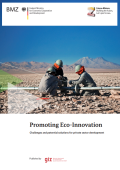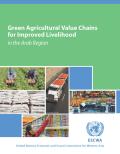
This paper, Promoting Eco-Innovation: Challenges and potential solutions for private sector development, begins with an exploration, in Chapter 1, of how eco-innovation is addressed in the current international debate. This refers mainly to the climate change negotiations and the recent Rio+20 conference. Chapter 2 then provides a working definition of eco-innovation and examines how it fits with the requirements of private sector development. Chapter 3 contains an overview of the general conditions under which eco-innovations are generated in developing countries, including both the supply side and the demand side. Chapter 4 discusses possible approaches in the context of German development cooperation, and asks which instruments can be used to foster new innovations and encourage their rapid dissemination.
The report includes case studies on the African continent, Egypt, Ethiopia, Germany, and India.
This study aims to provide a methodology for mapping the progress in the Arab region in the adoption and implementation of green economy policies. This mapping is proposed as a policy tool for governments of the ESCWA Region. As such, it is designed to identify the various challenges that the region faces as they still strive to achieve sustainable development, and to highlight potential opportunities for countries in the region to “green” their economies.
The study relies on a set of indicators that represent the transition to a green economy at the macro and micro level. Those indicators are based on those developed by the OECD, UNEP, and UNIDO, and adapted in such a way as to also reflect key social goals, such as the need for greater focus on social equity and poverty eradication. The papar includes a fact sheet of each of the countries in the Arab region, and detailed reports on four pilot countries: Egypt, Jordan, Lebanon, and Oman.
In order to harness opportunities afforded by an inclusive green economy approach, UNDP supports an array of nationally-defined development activities, applying corporate best practices incorporating environmental, governance, poverty reduction, capacity development, and gender perspectives. UNDP looks at its operations which have as many as possible of the following characteristics:
• emphasize the efficient and sustainable use of natural resources in a low-carbon pathway
• decrease (or protect against) environmental risks, emissions and pollution
• lead to increased income opportunities and/or employment generation
• lead to greater social equity and inclusion.

This report summarises the outcomes of the joint AfDB-OECD workshop, titled Enabling Green Growth in Africa, hosted by the Government of Zambia in Lusaka on January 15-16, 2013 and another two-day workshop on Strategic Environmental Assessments (SEA) and Green Economy that follows, organised by the OECD DAC SEA Task Team. The objective of the workshops was to facilitate an exchange of perspectives between regional member countries (RMCs) and development partners; and to explore the rationale and enabling environment for green growth in Africa through, notably, the sharing of country experiences. The report highlights how the outcomes of the two workshops will inform current and future green growth work in both organisations.
